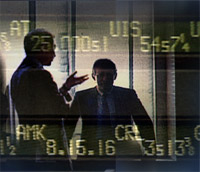Friday, December 01, 2006
Congress Looking At Insider Trading

Charles E. Grassley, the Iowa Republican and departing chairman of the Senate Finance Committee, has asked NASD, the securities industry's largest self-regulatory organization, to describe in detail how it identifies and tracks possible insider trading among its members.
Mr. Grassley's staff is investigating the Securities and Exchange Commission's handling of an insider-trading case involving a prominent hedge fund. The questions being asked of NASD indicate that Congressional scrutiny of the nation's market regulators is growing.
Insider trading appears to be a growing problem for regulators. In August, The New York Times reported that an analysis of the nation's biggest mergers during the last year found abnormal trading in the securities of 41 percent of the companies in the days and weeks before the deals became public. Those buying shares during these periods of unusual trading generated gains of as much as 40 percent. ...
Mr. Grassley asked NASD to describe its market surveillance tools, its sampling methods for capturing unusual trading around a market-moving event like a merger, its approach to repeat offenders and how it ensures that it "casts a wide net during market surveillance and oversight."
NASD was also asked to describe the types of enforcement actions it takes, the frequency of such actions and the degree to which the organization's enforcement efforts are overruled by the S.E.C. ...
Others in Congress are also interested in the apparent increase in insider trading. The Senate Judiciary Committee, overseen by Arlen Specter, a Pennsylvania Republican, until Congress changes hands next year, is expected to hold a hearing on Tuesday on the oversight of insider trading. ...
The request for information from the NASD comes amid an inquiry by Mr. Grassley's staff and the Senate Judiciary Committee into the S.E.C.'s handling of an insider-trading investigation involving Pequot Capital Management, a $7 billion hedge fund run by Arthur J. Samberg. That investigation, which began in 2004, centered on a number of profitable trades Pequot made in advance of mergers or other market-moving news.


